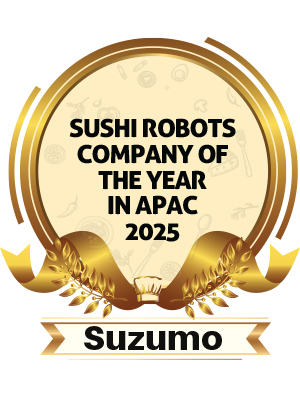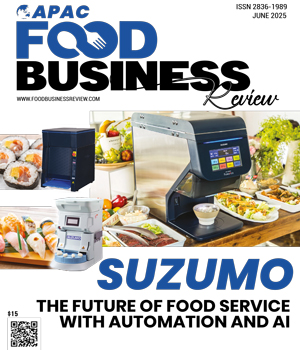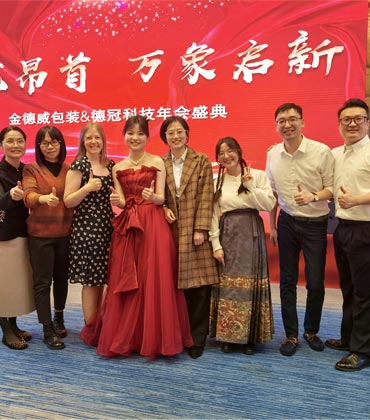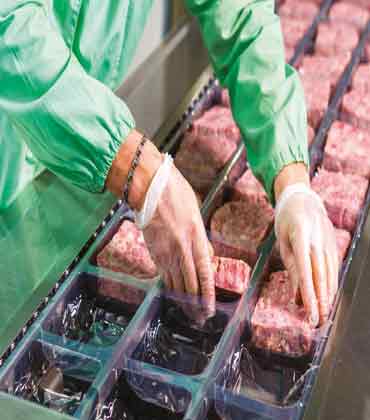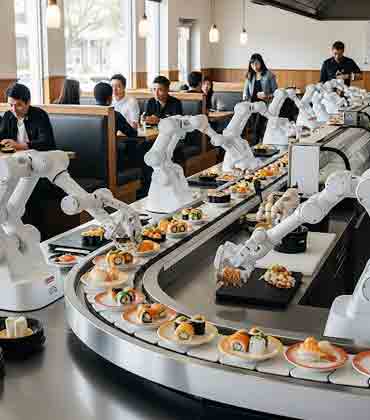Thank you for Subscribing to Food Business Review Weekly Brief
Whether crafting the perfect sushi with state-of-the-art robots or automating entire kitchen workflows, Suzumo is trailblazing the modernization of the food service industry through cutting-edge automation and AI-driven solutions. As food businesses seek greater efficiency, consistency and innovation, Suzumo is at the forefront—optimizing operations, reducing labor costs and ensuring high-quality food production at scale. With the acquisition of Japan System Project (JSP) in 2021, its focus shifted from solely manufacturing kitchen equipment to delivering complete restaurant automation solutions. By integrating AI and IoT, Suzumo provides comprehensive systems that enhance efficiency, reduce costs and ensure food safety at every stage of production and service. A Legacy of Innovation and Global Expansion Founded in 1961, Suzumo has grown into a global leader in food automation. It has a factory in Saitama Prefecture, Japan and operates through a consolidated business structure that includes JSP, which specializes in automation solutions for restaurant operations and SEH Japan Co., Ltd., which focuses on hygiene-related products. Suzumo International Corporation in the USA and Suzumo Singapore Corporation oversee global sales and distribution, while Bluefin Trading LLC in Dubai extends operations to the Middle East. “With our machines tailored to produce globally popular variations like the California roll and Dragon roll, we make Japanese cuisine more accessible and customizable worldwide,” Suzumo said. The company’s philosophy, “Delivering Deliciousness and Warmth to the world,” emphasizes its commitment to integrating advanced technology while respecting regional food cultures. AI-Driven Automation Reshaping Food Service Suzumo automation technology goes beyond food preparation, encompassing entire restaurant and supermarket operations. It has seamlessly incorporated AI-driven systems into multiple aspects of the dining experience. The auto reception seating arrangement system, “ARESEA,” optimizes seating arrangements and reduces wait times, enhancing customer experience. Automated self-ordering system “SEMOOR” boosts efficiency, minimizing human error and reducing staff workload. Currently, Suzumo is working on upgrading many of its AI systems to improve user convenience. For example, AI-powered monitoring systems track store activity, providing real-time insights into customer movement, optimizing stock levels and dynamically adjusting pricing based on demand patterns. In supermarkets, AI cameras constantly assess stock levels, preventing food waste by aligning production with real-time demand. These systems analyze peak shopping hours, seasonal trends and customer purchasing behavior, allowing for precise inventory adjustments. Suzumo’s demand forecasting AI factors in variables like weather conditions and regional buying trends to ensure that food is always stocked at optimal levels. The integration of AI-driven dish-up systems in restaurants ensures that food is plated accurately, maintaining consistency in portion sizes, quality and presentation. This technology also monitors food temperatures, guaranteeing that meals are served at ideal conditions while adhering to strict hygiene standards. Suzumo has changed back-end kitchen operations with its product management AI, which guides chefs and kitchen staff through efficient order fulfillment methods. By analyzing incoming orders and work patterns, the system helps manage kitchen workflow, reducing preparation time and ensuring quick service without sacrificing quality. In an industry where efficiency and consistency are paramount, these AI-driven solutions significantly reduce labor costs while enhancing productivity. Training new employees, which traditionally requires significant time and resources, has also been optimized through AI. Workers can acquire the necessary skills faster and with minimal supervision.
Food Packaging Supplier Company Of The Year In Apac 2025
Most packaging companies operate like a relay race. One vendor extrudes the film, another handles printing, a third manages lamination and someone else assembles the final product. Each handoff risks delay and inconsistency, with costs stacking up. Kinderway Packaging (KDW) was built to change that. Rather than outsourcing each stage, KDW brings the entire process in-house—from film extrusion and printing to lamination and pouch conversion. This integrated model provides more than operational control; it rethinks how flexible packaging should work. Packaging becomes structurally sound and shelf-ready and moves from concept to production without unnecessary friction. “Speed and flexibility are essential in fast-moving consumer goods (FMCG) like packaged food, personal care and household products. And when we have the end-to-end control, our R&D team is empowered to experiment, adapt and scale without the delays tied to third-party dependencies,” says Jacky Li, head of the overseas business unit at KDW. Scaling new ideas happens almost in real time—whether it’s recyclable films, high-barrier materials or advanced formats designed for product protection and shelf stability. At the same time, sustainability runs through every layer of the process. Solar-powered manufacturing, solvent recovery systems and responsible sourcing are built into daily operations and are not tacked on as afterthoughts. Independent certifications strengthen KDW’s foundation. Standards such as ISO, HACCP, FSSC, BRC and SMETA validate the practices, ensuring consistency, transparency and repeatability across global markets. Combined, these capabilities help brands accelerate time to market with packaging that performs in transit, commands attention on shelves and aligns with long-term sustainability goals. Teams in China, Australia and Mexico add regional agility to this global consistency—turning packaging into a strategic advantage instead of an operational burden..
Wine Producer Of The Year In Apac 2025
Picture relishing the delightful nuances of Robert Mondavi Cabernet Sauvignon, immersing you in the charm of Napa Valley’s sun-soaked vineyards. Or perhaps indulging in the crisp, citrus notes of Kim Crawford Sauvignon Blanc that evokes images of New Zealand’s picturesque landscapes. These exquisite experiences are but a glimpse into the portfolio of Constellation Brands (NYSE: STZ), a revered titan in the sphere of wine craftsmanship and ingenuity. Founded by Marvin Sands in upstate New York under the name Canandaigua Industries, the company embarked on its journey with a humble beginning, initially focusing on the sale of bulk wine in barrels. Despite modest beginnings, its entrepreneurial spirit propelled it forward, grossing notable sales within the first few years. Throughout the ensuing decades, Constellation Brands experienced significant growth and expansion. By 1951, it had achieved a milestone of $1 million in sales, signaling a burgeoning presence in the market. A pivotal growth moment arrived in 1954 with the introduction of Richard’s Wild Irish Rose. This period also witnessed the company’s transition to public ownership, rebranding as Canandaigua Wine Company, Inc. in 1973. The following years saw Constellation Brands engaging in strategic acquisitions to strengthen its portfolio and extend its reach. In 1974, the acquisition of Bisceglia Brothers Winery in California marked a significant expansion into new territories, laying the groundwork for future growth. The launch of J. Roget Champagne in 1979 further diversified the offerings and solidified the company’s presence as a key player in the sparkling wine market. Subsequent endeavors, such as the integration of Barton Incorporated in 1993, underscored the company’s commitment to diversification and innovation. In 2000, Constellation Brands initiated a transformative phase, culminating in a significant rebranding effort that saw the company adopt its current name. This pivotal moment signaled the beginning of a new era, characterized by expansion into global markets through strategic acquisitions. Advancing Innovation and Collaboration “With every step we take, we are positioning Constellation for sustained, long-term success and invite you to learn more about our journey to realize our bold ambitions,” says Bill Newlands, President and CEO of Constellation Brands. “We have a great product portfolio, a relentless focus on the consumer, the right strategy, and a diverse and talented team in place to drive us toward that future.” Constellation Brands is always on the lookout for forward-thinking partners who share its passion to push boundaries and deliver what’s next. The company is dedicated to fostering enduring and impactful collaborations within the industry. Its primary objective is to propel industry growth by cultivating capabilities, sharing resources, and fostering innovation, all aimed at enhancing quality and enriching the consumer experience.
CXO INSIGHTS

Ensure That Palm Oil Products Are Environmentally Friendly and Sustainable
Antoni Simamora, Environment & Sustainability Manager, First Resources [SGX: EB5]

Empowering Individuals to Adapt Food Safety Practices
Paul Berry, Senior Food Safety Manager, Subway

Redefining Hospitality Through Experience-Driven Leadership
Kevin Pham, Food & Beverage Manager, Pullman Hotels & Resorts

Driving Growth Through Innovative Strategies
Tom Marzella, Commercial Director - Oceania, Glanbia Nutritionals

Leading Sustainable Innovation and Strategic Procurement
Alleyn MacGregor, Commercial Manager, Procurement Packaging ANZ, Goodman Fielder
IN FOCUS
EDITORIAL
Leading the Future of Food
A slew of tech developments is fueling this growth. Automation, AI, and data analytics are streamlining operations, improving food safety, and enabling smarter supply chains. Trends in robotics are revolutionizing food preparation and packaging, while digital platforms are reshaping how products reach consumers. At the same time, sustainability innovations, from biodegradable materials to energy-efficient processes, are helping businesses meet rising environmental standards without compromising on performance.
This edition of Food Business Review APAC brings recent developments across the food industry and insights into how forward-looking companies are leveraging innovation to stay competitive, adapt to change, and lead the future of food.
It features thought leadership articles from industry experts, including Paul Berry, senior food safety manager at Subway, who delves into the key challenges in the food and beverage industry, particularly the lack of food safety knowledge and reactive responses during the pandemic. Alberto Regini, plant operations director at Dobla, shares valuable insights into Vietnam’s natural advantages for organic farming, such as fertile land, diverse climate, and traditional agricultural practices.
We hope this edition, featuring the top Sushi Robots Company of the Year in APAC 2025, Food Packaging Supplier Company of the Year in APAC 2025, and Wine Producer of the Year in APAC 2025, helps you build the partnerships your organization needs to sharpen its competitive edge in today’s food industry.


